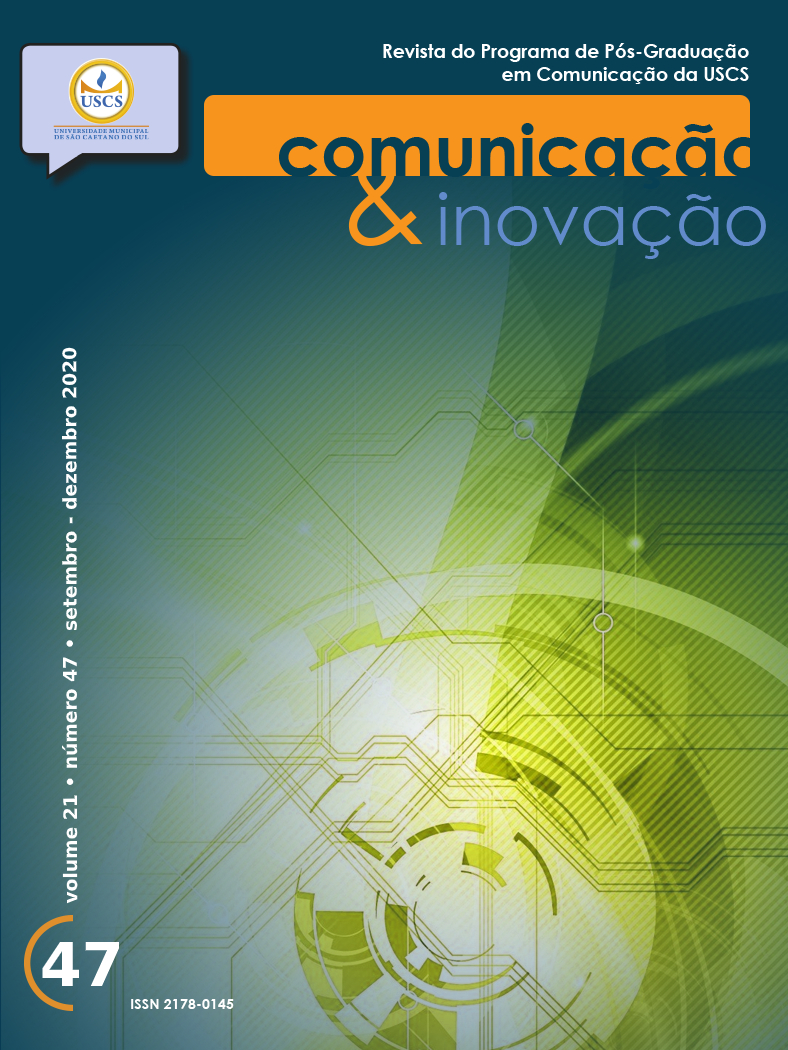Afetividade e relacionamentos em tempos de isolamento social: intensificação do uso de mídias sociais para interação durante a pandemia de COVID-19
Emotions and relationships during social isolation: intensifying the use of social media for interaction during the COVID-19 pandemic
Palavras-chave:
COVID-19, coronavírus, pandemia, isolamento social, mídias sociais, interaçãoResumo
Com a rápida disseminação do novo coronavírus (COVID-19) em escala global, o distanciamento social passou a ser imposto como importante forma de contenção da pandemia e para evitar o esgotamento do sistema de saúde. Diante desta longa quarentena mundial, situação inédita na história da humanidade, este estudo visa discutir as mudanças no bem-estar emocional e como as mídias sociais passaram a ser usadas para a manutenção dos relacionamentos com amigos e familiares no período de isolamento. Através de uma pesquisa quantitativa (N=725), buscou-se refletir sobre como as interações online foram conduzidas como forma de enfrentamento do distanciamento social que inviabilizou os contatos presenciais.
Downloads
Referências
GAO, Junling et al. Mental health problems and social media exposure during COVID-19 outbreak. PLOS ONE, [S. l.], v. 15, n. 4, p. e0231924, 2020. Disponível em: https://doi.org/10.1371/journal.pone.0231924
GOLECHHA, Mahaveer. COVID-19, India, lockdown and psychosocial challenges: What next? International Journal of Social Psychiatry, [S. l.], p. 002076402093592, 2020. Disponível em: https://doi.org/10.1177/0020764020935922
HAWKE, Lisa D. et al. Impacts of COVID-19 on Youth Mental Health, Substance Use, and Well-being: A Rapid Survey of Clinical and Community Samples. The Canadian Journal of Psychiatry, [S. l.], p. 1-9, 2020. Disponível em: https://doi.org/10.1177/0706743720940562
ILLOUZ, Eva. Amor nos tempos do capitalismo. Rio de Janeiro: Zahar, 2011.
MAHMUD, Md. Shahed; TALUKDER, Mesbah Uddin; RAHMAN, Sk. Mahrufur. Does 'Fear of COVID-19' trigger future career anxiety? An empirical investigation considering depression from COVID-19 as a mediator. International Journal of Social Psychiatry, [S. l.], p. 002076402093548, 2020. Disponível em: https://doi.org/10.1177/0020764020935488
MASLOW, Abraham H. A Theory of Human Motivation. Psychological Review, v. 50, n. 4, p. 370-396, 1943.
MASLOW, Abraham H. Motivation and personality. New York: Harper and Low, 1970. E-book.
MATIAS, Thiago; DOMINSKI, Fabio H.; MARKS, David F. Human needs in COVID-19 isolation. Journal of Health Psychology, [S. l.], v. 25, n. 7, p. 871-882, 2020. Disponível em: https://doi.org/10.1177/1359105320925149
ORGANIZAÇÃO MUNDIAL DA SAÚDE. Q&A on coronaviruses (COVID-19). In: WHO | World Health Organization. 17 abr. 2020. Disponível em: https://www.who.int/emergencies/diseases/novel-coronavirus-2019/question-and-answers-hub/q-a-detail/q-a-coronaviruses#. Acesso em: 14 ago. 2020.
ORGANIZAÇÃO MUNDIAL DA SAÚDE. What is a pandemic?. In: WHO | World Health Organization. 24 fev. 2010. Disponível em: https://www.who.int/csr/disease/swineflu/frequently_asked_questions/pandemic/en/. Acesso em: 14 ago. 2020.
PIERCE, Matthias et al. Mental health before and during the COVID-19 pandemic: a longitudinal probability sample survey of the UK population. The Lancet Psychiatry, [S. l.], p. S2215036620303084, 2020. Disponível em: https://doi.org/10.1016/S2215-0366(20)30308-4
ROBBINS, Tim et al. COVID-19: A new digital dawn? DIGITAL HEALTH, [S. l.], v. 6, p. 205520762092008, 2020. Disponível em: https://doi.org/10.1177/2055207620920083
TAYLOR, Steven. The Psychology of Pandemics: Preparing for the Next Global Outbreak of Infectious Disease. Newcastle upon Tyne: Cambridge Scholars Publishing, 2019. E-book.
TORALES, Julio et al. The outbreak of COVID-19 coronavirus and its impact on global mental health. International Journal of Social Psychiatry, [S. l.], v. 66, n. 4, p. 317-320, 2020. Disponível em: https://doi.org/10.1177/0020764020915212
TURKLE, S. Alone Together: Why we expect more from technology and less from each other. New York: Basic Books, 2011.
VALIKA, Taher S.; MAURRASSE, Sarah E.; REICHERT, Lara. A Second Pandemic? Perspective on Information Overload in the COVID-19 Era. Otolaryngology-Head and Neck Surgery, [S. l.], p. 019459982093585, 2020. Disponível em: https://doi.org/10.1177/0194599820935850
XIAO, Chunfeng. A Novel Approach of Consultation on 2019 Novel Coronavirus (COVID-19)-Related Psychological and Mental Problems: Structured Letter Therapy. Psychiatry Investigation, [S. l.], v. 17, n. 2, p. 175-176, 2020. Disponível em: https://doi.org/10.30773/pi.2020.0047
Downloads
Publicado
Edição
Seção
Licença
Direitos autorais (c) 2020 Alex Primo

Este trabalho está licenciado sob uma licença Creative Commons Attribution-NonCommercial-NoDerivatives 4.0 International License.
Conforme consta nas normas da revista, o envio de artigos e textos solicitando a apreciação com a finalidade de publicação na Comunicação & Inovação, configura a cessão de direitos autorais.
No caso de fotos e imagens, o autor deve providenciar documento que ateste a permissão em termos de direitos autorais.





